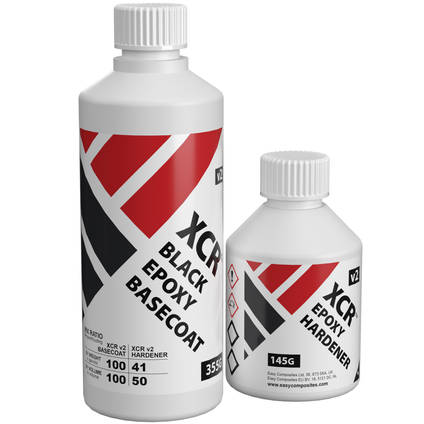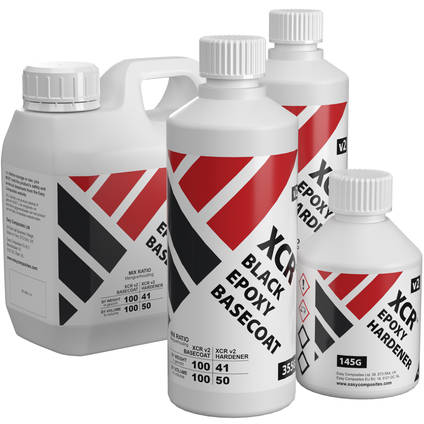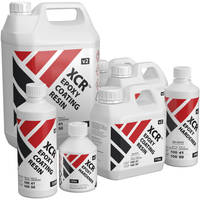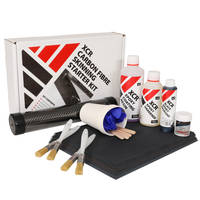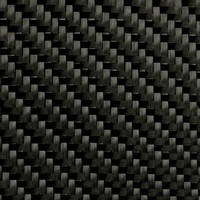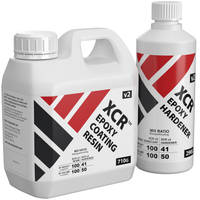Need any help or advice?+44 (0)1782 454499
Downloads (3)
This is a chemical product. Before storage or use you must download and read the accompanying safety and technical datasheets.
| Safety Datasheet (SDS) | ||
| Dutch Safety DataSheet | ||
| Technical Datasheet (TDS) |
Specification
Product Data
| Colour | Black | |
|---|---|---|
| Shelf Life | 12 | Months |
| Chemistry / Material | Epoxy | |
| Viscosity | 2000 | mPa.s |
| UV Resistance | Very Good | |
| Brand | Easy Composites |
Pot Life and Cure Times
| Max Service Temp | 80 | °C |
|---|---|---|
| Pot Life (Typical) | 8 | mins |
| Initial Cure Time | 8.5 | Hrs |
Cured Mechanical Properties
| Flexibility | Hard / Rigid | |
|---|---|---|
| Tensile Strength | 68.0 | MPa |
| Tensile Modulus | 3.40 | GPa |
| Compressive Strength | 103 | MPa |
| Elongation at Break | 6.5 | % |
| Tg Onset (DMA) | 80 | °C |
General Properties
| Gross Weight | 0.576 | kg |
|---|
Shipping Information
Restrictions
This product is classed as dangerous goods for transport.
It can be shipped to all mainland EU countries, Ireland, Balearic Islands, Corsica, Sicily and Sardinia.
Unfortunately, for the time being we are unable to ship dangerous goods to Cyprus, Malta, the Canary Islands, Ceuta, Melilla, Jan Mayan and Svalbard.
For a full information regarding the shipment of dangerous goods, see our delivery information page.
Package Size
There are no package size restrictions or surcharges for this product.
Delivery Cost
To find the delivery cost of this item to your address, add it to your basket and then use the instant shipping calculator on the basket page.
XCR Black Epoxy Basecoat
- EP-XBC-05
Hazardous
- 5/5 Average rating
XCR Basecoat is a black epoxy primer coat intended for use when skinning or wrapping parts with carbon fibre. XCR Basecoat bonds the carbon fibre reinforcement to the original part being covered whilst at the same time providing a strong black background for the carbon, preventing the colour of the original component being visible from under the carbon fabric. Recommended for use with XCR Epoxy Coating Resin.
Sold as a kit (resin and hardener). Available to buy online in 500g and 1kg kits.
PRODUCT VERSIONS
Kit Size
AVAILABILITY:More than 10 availablefor immediate shipping
We won’t be beaten on price!
If you believe you’re buying an equivalent product cheaper elsewhere, contact us to discuss your requirements.
XCR™ XCR Black Epoxy Basecoat is an ultra-black epoxy primer coat intended for use when 'skinning' or 'wrapping' parts with carbon fibre. The purpose of the skinning basecoat is to bond the carbon fibre reinforcement to the original part being covered whilst at the same time providing a strong black background for the carbon, preventing the colour of the original component being visible from under the carbon fabric.
XCR Black Epoxy Basecoat is designed specifically for use with our XCR Epoxy Coating Resin; the two resins working together to fully bond the carbon fibre to the original part and then provide a hard-wearing, highly polish-able, UV stabilised gloss finish.
In common with the XCR Epoxy Coating Resin, XCR Black Epoxy Basecoat has been formulated for rapid cure and will reach its 'B-stage' within just a few hours. Once the basecoat has reached its B-stage it will be firm but still tacky which is the correct point at which the carbon fibre should be pressed down only it. The basecoat should then be allowed to cure further before layers of XCR Epoxy Coating Resin are applied over the top of the carbon fibre.
To see how XCR Black Epoxy Basecoat is used as part of the XCR Carbon Fibre Skinning process, take a look at the video tutorial below for our XCR Carbon Fibre Skinning Starter Kit and scan through to the section 'Mix and Apply Basecoat'.
How to Cover Existing Parts in Carbon Fibre - XCR Skinning Tutorial
Further Information
Compatible Materials
It's important to be aware that some plastics (including polypropylene, polyethylene, HDPE and others) can be very difficult to bond to. Parts made using these or similar plastics are unsuitable for skinning or would need to be prepared with a suitable primer which is capable of bonding to the specific plastic. If you are unsure, test a small area first before proceeding.
Settling
In some case it is possible that the pigments in the basecoat will settle to the bottom of the container during transit or storage. We always recommend giving the bottle a good shake to redistribute this pigment but if this is insufficient to produce the strong black colour then you may need to physically stir the resin in the bottle to bring back the density of colour.
Compatibility Information - Dos and Don'ts
Although by no means an exhaustive list, the materials, pigments and additives listed below have all been tested and are known to work well with XCR Basecoat Resin.
Compatible Moulds
- Epoxy, Polyester & Vinylester mould systems
- EPS & PU foams/modelboards.
- Carbon & glass woven fabrics
- Natural fabrics & materials - eg flax, jute, denim, cotton etc.
- Wood
Compatible Pigments
- Already pigmented Black.
Compatible Materials
- All dry filler powders
- Metal Powders
- Photoluminescent (glow in the dark) powders
Key Processing Information
- Ease of Use: Suitable for professional and hobby use (follow SDS advice).
- Odour: XCR Basecoat Resin is almost odourless.
- Safety Precautions: Wear gloves and goggles and work in a well ventilated area. Always read the SDS before use.
- Ambient Conditions: Can be used from 15 to 30°C although pot-life and cure time will be affected significantly. For best results laminating at an ambient of 20-25°C is required.
- Degassing: Not necessary. Simply mix and use.
- Mix Ratio: Mix 'Resin and 'Hardener' 100:41 by weight. Use digital scales.
- Mixing: Shake bottle to distribute pigment before measuring out. Mix thoroughly by hand for at around 1 minute.
- Pot-Life: 8 minutes. Be sure to pour your casting(s) before this time.
- Exotherm (Over-Heating): Resin will heat-up whilst it cures. Very large batches of mixed resin in a pot will quickly overheat (exotherm) and can smoke/ignite. Never leave mixed resin unattended.
- Maximum Thickness: Maximum thickness per layer is 1mm.
- Overcoat Time: 2 hour 51 minutes at 20°C
- Initial Cure Time/Demould: Initial cure time is 8 hours 33 minutes to touch dry. Full hardness achieved over 24 hours, ambient temperature dependent.
For more detailed process specific information, full instructions and mechanical data, please download the technical datasheet from the datasheets tab.
XCR™ XCR Black Epoxy Basecoat is an ultra-black epoxy primer coat intended for use when 'skinning' or 'wrapping' parts with carbon fibre. The purpose of the skinning basecoat is to bond the carbon fibre reinforcement to the original part being covered whilst at the same time providing a strong black background for the carbon, preventing the colour of the original component being visible from under the carbon fabric.
XCR Black Epoxy Basecoat is designed specifically for use with our XCR Epoxy Coating Resin; the two resins working together to fully bond the carbon fibre to the original part and then provide a hard-wearing, highly polish-able, UV stabilised gloss finish.
In common with the XCR Epoxy Coating Resin, XCR Black Epoxy Basecoat has been formulated for rapid cure and will reach its 'B-stage' within just a few hours. Once the basecoat has reached its B-stage it will be firm but still tacky which is the correct point at which the carbon fibre should be pressed down only it. The basecoat should then be allowed to cure further before layers of XCR Epoxy Coating Resin are applied over the top of the carbon fibre.
To see how XCR Black Epoxy Basecoat is used as part of the XCR Carbon Fibre Skinning process, take a look at the video tutorial below for our XCR Carbon Fibre Skinning Starter Kit and scan through to the section 'Mix and Apply Basecoat'.
How to Cover Existing Parts in Carbon Fibre - XCR Skinning Tutorial
Further Information
Compatible Materials
It's important to be aware that some plastics (including polypropylene, polyethylene, HDPE and others) can be very difficult to bond to. Parts made using these or similar plastics are unsuitable for skinning or would need to be prepared with a suitable primer which is capable of bonding to the specific plastic. If you are unsure, test a small area first before proceeding.
Settling
In some case it is possible that the pigments in the basecoat will settle to the bottom of the container during transit or storage. We always recommend giving the bottle a good shake to redistribute this pigment but if this is insufficient to produce the strong black colour then you may need to physically stir the resin in the bottle to bring back the density of colour.
Compatibility Information - Dos and Don'ts
Although by no means an exhaustive list, the materials, pigments and additives listed below have all been tested and are known to work well with XCR Basecoat Resin.
Compatible Moulds
- Epoxy, Polyester & Vinylester mould systems
- EPS & PU foams/modelboards.
- Carbon & glass woven fabrics
- Natural fabrics & materials - eg flax, jute, denim, cotton etc.
- Wood
Compatible Pigments
- Already pigmented Black.
Compatible Materials
- All dry filler powders
- Metal Powders
- Photoluminescent (glow in the dark) powders
Key Processing Information
- Ease of Use: Suitable for professional and hobby use (follow SDS advice).
- Odour: XCR Basecoat Resin is almost odourless.
- Safety Precautions: Wear gloves and goggles and work in a well ventilated area. Always read the SDS before use.
- Ambient Conditions: Can be used from 15 to 30°C although pot-life and cure time will be affected significantly. For best results laminating at an ambient of 20-25°C is required.
- Degassing: Not necessary. Simply mix and use.
- Mix Ratio: Mix 'Resin and 'Hardener' 100:41 by weight. Use digital scales.
- Mixing: Shake bottle to distribute pigment before measuring out. Mix thoroughly by hand for at around 1 minute.
- Pot-Life: 8 minutes. Be sure to pour your casting(s) before this time.
- Exotherm (Over-Heating): Resin will heat-up whilst it cures. Very large batches of mixed resin in a pot will quickly overheat (exotherm) and can smoke/ignite. Never leave mixed resin unattended.
- Maximum Thickness: Maximum thickness per layer is 1mm.
- Overcoat Time: 2 hour 51 minutes at 20°C
- Initial Cure Time/Demould: Initial cure time is 8 hours 33 minutes to touch dry. Full hardness achieved over 24 hours, ambient temperature dependent.
For more detailed process specific information, full instructions and mechanical data, please download the technical datasheet from the datasheets tab.
Specification
Product Data
| Colour | Black | |
|---|---|---|
| Shelf Life | 12 | Months |
| Chemistry / Material | Epoxy | |
| Viscosity | 2000 | mPa.s |
| UV Resistance | Very Good | |
| Brand | Easy Composites |
Pot Life and Cure Times
| Max Service Temp | 80 | °C |
|---|---|---|
| Pot Life (Typical) | 8 | mins |
| Initial Cure Time | 8.5 | Hrs |
Cured Mechanical Properties
| Flexibility | Hard / Rigid | |
|---|---|---|
| Tensile Strength | 68.0 | MPa |
| Tensile Modulus | 3.40 | GPa |
| Compressive Strength | 103 | MPa |
| Elongation at Break | 6.5 | % |
| Tg Onset (DMA) | 80 | °C |
General Properties
| Gross Weight | 0.576 | kg |
|---|
You can simply use the XCR in it's clear form as the basecoat. Alternatively, adding some white CULR pigment will turn the resin white https://www.easycomposites.co.uk/super-white-epoxy-pigment
It's hard to picture a scenario where you would want to use these two materials together. If you're wanting to 'skin' something in a flexible resin then it would be better to add some black epoxy pigment to the EF80 to make a flexible black basecoat. However, EF80 is not designed as a skinning resin and nor would it behave like one so I'm not sure whether you'd achieve what you're looking for with this. Certainly conduct some trials to check whether you get the effect/results you're looking for.
The basecoat is just there to ensure that the carbon fabric sticks firmly to the material underneith. After sticking the cloth to the basecoat you need to build up layers of clear resin over the top of the part and then flat and polish this resin to have the finished, glossy appearance.
Yes, Carbon Skinning Basecoat will bond to MDF. For the best bond we recommend keying the surface of the MDF and ensuring it is clean and free from any contaminants or dust.
ASK YOUR OWN QUESTION
Customer Product Reviews for XCR Black Epoxy Basecoat
Perfect basecoat
Perfect as a basecoat basecoat does not smell too strong and adheres very well.
SUBMIT YOUR OWN PRODUCT REVIEW
We publish all reviews for verified purchases. Submit your own review and help other customers with their choices.SUBMIT YOUR OWN PRODUCT REVIEW
We publish all reviews for verified purchases. Submit your own review and help other customers with their choices.Shipping Information
Restrictions
This product is classed as dangerous goods for transport.
It can be shipped to all mainland EU countries, Ireland, Balearic Islands, Corsica, Sicily and Sardinia.
Unfortunately, for the time being we are unable to ship dangerous goods to Cyprus, Malta, the Canary Islands, Ceuta, Melilla, Jan Mayan and Svalbard.
For a full information regarding the shipment of dangerous goods, see our delivery information page.
Package Size
There are no package size restrictions or surcharges for this product.
Delivery Cost
To find the delivery cost of this item to your address, add it to your basket and then use the instant shipping calculator on the basket page.
RELATED PRODUCTS
CUSTOMERS ALSO PURCHASED
RELATED PRODUCTS
CUSTOMERS ALSO PURCHASED
100% SECURE
PAYMENT METHODS
Easy Composites EU B.V., registered in the Netherlands 73601195. All content copyright (C) Easy Composites Ltd, 2025. All rights reserved.
